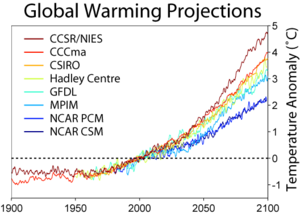Playing the Ultimatum Game in the Garden of Eden
Behavioral economists, seeking to understand just how humans will face global warming, turn to Game Theory and the Ultimatum Game.
A deceptively simple test, the Ultimatum Game is a measure of satisfaction, trust and fairness in a simple economic transaction. Researchers run this test and others like it to learn about human cooperation in facing the changes of global warming.
It goes like this:
The experimenter tells two subjects that he will give one of them a sum of money
that they may split. One person will decide how much to give to the other. The other person may accept or reject the offer. If accepted then both keep whatever money they hold. However, if the other person thinks it unfair - then by refusing money prevents both of them from getting any cash. Session over. The test is given once only.
The results for the Ultimate Game show that many groups will accept a small
percentage. If the experimenter gave 100 dollars, then $5 might be shared. The data for Western subjects measured more - 30-40%… meaning they were willing to cut off all wealth until reaching a higher fairness level. Some even insisted on 50%.
Economists prefer to think of humans as rational actors who would logically choose the best deal in any situation. Rational actions are easier to formulate and model. The irrational choice of cutting off all money and ending play is harder to understand. Was it the sense of fairness? Shared suffering? One can see how this game may apply to the economics of global warming.
Our civilization is in the midst of a real-world experimental play of the Ultimatum Game. One player distributes the great carbon energy wealth pulled from the earth, and the other player receives the benefit of that offer. Our incredibly cheap carbon fuel energy from coal, oil, and natural gas combustion all release CO2 into the atmosphere. CO2 reacts slowly, but eventually triggers greenhouse heating in the atmosphere. The effects of CO2, not obvious at first, is very real - a major greenhouse gas that slowly heats and destabilizes our climate . It is directly caused by burning carbon fuels. We are killing ourselves.
“The related fields of behavioral economics, game theory, and neuroscience have confirmed that
human behavior is other regarding, and that people exhibit systematic patterns of
decision-making that are “irrational” … the standard economic approach to climate change policy, with its almost exclusive emphasis on rational responses to monetary incentives, is seriously flawed. In fact, monetary incentives may actually be counter-productive. Humans are unique among animal species in their ability to cooperate across cultures, geographical space and generations. Tapping into this uniquely human attribute, and understanding how cooperation is enforced, holds the key to limiting the potentially calamitous effects of global climate change.”
— John M. Gowdy 2007
http://www.economics.rpi.edu/workingpapers/rpi0701.pdf
A related experiment is the Dictator Game where the player with cash keeps as much as they wish whether or not an offer to share is accepted. Predictably, dictators make far less equal offers, keeping a larger share of the cash. With really no choice, the second player always accepts unequal money.
In the commercial marketplace we can see a privileged holder of energy wealth, sharing or selling to a less privileged player. The less privileged ones may constantly accept this marketplace deal, until the deal changes unacceptably; perhaps the privileged one goes too far in crossing a clearly defined line - perhaps deceit, manipulation, denial, ethical transgression or realizing the bad ramifications of the deal. In the real world this might be like seeing billion dollar bailouts go to banks - and suddenly realizing it will raise taxes and condemn our future to horrible debt.
Both the Ultimatum and the Dictator games seem to mimic the market play of Big Coal and Big Oil in our economy. Carbon fuel industries - with a monopolistic lock on the market - sell energy - and heavily promote and market to consumers to consume all they can deliver. But carbon consumption kills our future. As our understanding of the CO2 mechanism grows ever more grim, we re-evaluate the structure of the carbon fuel game as something that crosses the line.
Just like games played with economics researchers - always with real cash - one can imagine a great experimenter freely bestowing vast wealth to humans in the form of a lush planet, yielding forests, ocean harvests, mining mineral ores, oil and coal. Humans are Adam and Eve in the Garden of Eden - all has been essentially free, given like money in the Ultimate Game experiment. And we get just one play. The first line of carbon fuel recipients consistently redistribute a portion of the wealth to others: employees, clients, stock holders and directly to consumers. In the Ultimate Game of carbon based fuels, what percentage of wealth is shared? ExxonMobil brought in yearly profit stockholders nearly $40 billion, so the ratio of owner wealth to consumer benefit must be a very high ratio. If we played this as a laboratory version of Ultimate Game, we would see a small fractional award, perhaps less than 1%. We do not know. Students in economics will write many papers defining the percentage of this carbon energy wealth that makes it to the consumer Only then to ponder what percentage of this wealth is lost to a degrading future.
Whether the game is Ultimatum or Dictator - the carbon fuel privileged player derives vast wealth, vast power by giving the recipient player generations of cheap power, cheap electricity leading to cheap manufacturing and then to cheap mortgages, a rising value of real estate, easy credit, rising stocks, etc. The Trickle Down wealth runoff to the recipient is a very small fraction of the vast wealth retained by the primary player. And now with a crumbling economy and growing desperation, the satisfaction evaporates and the game becomes desperate or ruthless.
The implicit rule of a real-life Ultimatum Game is this must be a safe transaction, with an honest description of the terms and true costs of the deal. Plentiful coal is dug and sold cheaply, and we get warm electricity. But the value of the uncounted soot, CO2 and ash ponds poisoning life itself and then our 30% share (or whatever percentage we want) is now gone - ruining what we thought was a good deal. We less than nothing with the promise of a damaged future. What is the new value of any transaction that dooms our future?
So the largess of a Dictator or Ultimate player now goes to recipients that are now beginning to awaken and sense the trap. Our carbon fuels are not cheap at any cost. The bounteous carbon warmth today will only hasten CO2 greenhouse doom tomorrow. Carbon fuel companies have reduced our cost of oil, coal and gas; all cheapened so as to increase the percentage of wealth delivered to the other game players. As energy consumers, we blindly accept this; we keep driving and heating and carbon burning in order to stay engaged in the game.
The real life game player, whether a rational and/or irrational actor will doubt, delay and eventually call a halt to this play - demanding for a new agreement.
Change itself changes. An increasing rate of climate destabilization multiplied by a sinking economy nurtures and defines a new, higher-stakes game - essentially a survival game. The terms of this new survival game will constantly change as our environment and economy changes. Except for behavioral economists, this does not bode well.
After more than a century of a high carbon industrial output we are accounting for the true cost to our economy and future. In our precarious state, any further industrial CO2 output increases the problem and moves our demise closer. The desperate tactic of setting an ultra-low cost to carbon energy now - as a player payoff - means nothing if no one survives.
The argument now is whether we abandon our carbon game immediately or play it out any further.
Behavioral economics gives us a new way of looking at our situation. Those who adopt the dictator stance of economic transaction will be rudely shocked to discover that C02 and atmospheric science does not negotiate with economists.
Richard Pauli
January 2009
More reading in behavioral economics and global warming:
http://en.wikipedia.org/wiki/Ultimatum_game
http://www.economics.rpi.edu/workingpapers/rpi0701.pdf
http://ideas.repec.org/p/rpi/rpiwpe/0701.html
http://noimpactman.typepad.com/blog/2008/07/human-motivatio.html
http://tonysclimateblog.blogspot.com/2008/02/behavioral-economics.html
http://europe.theoildrum.com/tag/behavioral_economics
http://www.tdaxp.com/archive/2006/10/21/quick-dirty-literature-review-for-the-ultimatum-game.html
http://www.fte.org/capitalism/activities/ultimatum/index.html
Similar postings to http://theboywhodeniedwolf.com, http://climatedebatedaily.org






